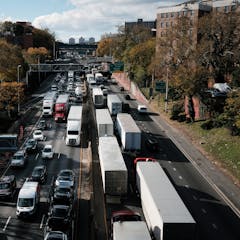
Articles sur Bicycle lanes
Affichage de 1 à 20 de 80 articles

Male cyclists greatly outnumber female cyclists in Australia. New research points to ways to close the gap.

We want healthy, liveable cities and to cut emissions to net zero. Getting more people to use bicycles instead of cars will go a long way towards achieving these goals.

Cycling in Canada has been experiencing a great boom in recent years. Yet, there was no consistent and complete way to measure cycling infrastructure, until now.

Bike riders wear helmets and high-vis vests to reduce their vulnerability on the road. Problem is a new study finds this dehumanises cyclists, putting them more at risk of aggression from drivers.

Lagos is famous for its congested traffic. Cycling could help change this image.

Noise pollution is a serious problem, and cars make a lot of it. But roads are also a factor.

We found people from the UK and Australia usually misunderstand the impact cycle lanes have on speed limits – wrongly believing addition of a cycle lane means cars would inevitably need to go slower.

The audio version of an in-depth article on the 12 best ways to get cars out of cities.

Transport planners estimate money spent on high-quality cycling infrastructure yields benefits between ten and 25 times the costs.

The budget will reveal some extra spending, but the Emissions Reduction Plan still treats climate change as merely a scientific, technical problem – when it has been a political problem all along.

Tackling climate change is a budget priority, but will we see the major investment in cycling infrastructure and public transport that is one obvious solution?

Women in cities tend to get more walking done, which is beneficial to both their health and the climate. Making streets safer for cycling would give them greater access to cities too.

We surveyed over 4,000 Victorians and found more than three-quarters are interested in riding a bike, but only in infrastructure that separates people from cars – such as protected bike lanes.

Building a culture of cycling is essential, especially where bike use is low. A global movement of community bike workshops, also known as bike kitchens, can help.

London was rated 2021’s most congested city.

What will the US$1.2 trillion infrastructure bill pay for? Here are some of the things it will help build, fix or remove.

It’s time to stop demonising cyclists and cycling activists as elitists — the accusation fails at the first test.

The pandemic could be a boon to car use, but it would be a mistake for governments to let that happen. There’s a golden opportunity to push towards a zero-carbon transportation system.

Electric scooter rides soared from zero to 88 million a year between 2017 and 2019. But launching e-scooters in cities without safe infrastructure or clear rules of the road can be deadly.

Many people prefer the status quo as they struggle to imagine the alternatives. The pandemic has been the catalyst for urban experiments that have opened our eyes to new possibilities.
